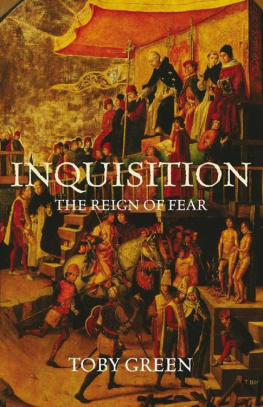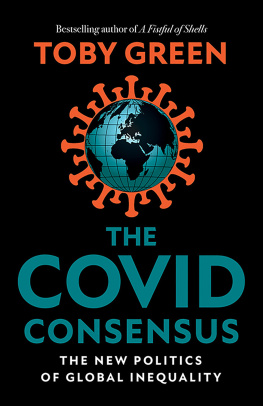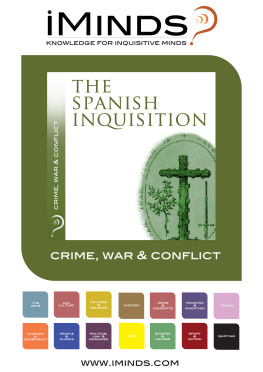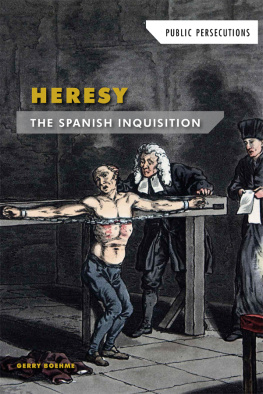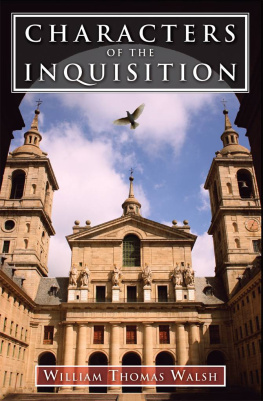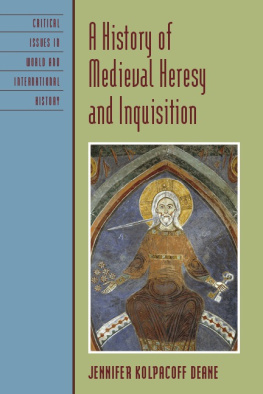TOBY GREEN
INQUISITION
THE REIGN OF FEAR
PAN BOOKS
F OR I AN,
ALWAYS AN INSPIRATION
F OR ALL THOSE WHO SUFFERED
AT THE HANDS OF THE I NQUISITIONS
OF P ORTUGAL AND S PAIN
First they came for the Jews
and I did not speak out because I was not a Jew.
Then they came for the Communists
and I did not speak out because I was not a Communist.
Then they came for the trade unionists
and I did not speak out because I was not a trade unionist.
Then they came for me
and there was no one left to speak out for me.
Pastor Martin Niemller
P ICTURE A CKNOWLEDGEMENTS
Credits are by page number in order from left to right and top to bottom.
I Biblioteca Nacional, Madrid / The Bridgeman Art Library; British Library. 2 Mary Evans Picture Library. 3 Libro Rojo, Archivo General de la Nacin (Mexico) / Cambridge University Library; Mary Evans Picture Library. 4/5 Real Academia de Bellas Artes de San Fernando, Madrid / The Bridgeman Art Library. 6/7 Mary Evans Picture Library (all). 8 Mary Evans Picture Library (both). 9 British Library; Mary Evans Picture Library. 10 Brown University Library, Providence, Rhode Island / The Bridgeman Art Library. II Mary Evans Picture Library; British Library. 12 British Library. 13 Libro Rojo, Archivo General de la Nacin (Mexico) / Cambridge University Library (all). 14 Bonhams, London / The Bridgeman Art Library. 15 Prado, Madrid / The Bridgeman Art Library (both). 16 Bibliothque des Arts Dcoratifs, Paris / The Bridgeman Art Library; Bibliothque Nationale, Paris / The Bridgeman Art Library
Acknowledgements
This book is the fruit of over four years research, and almost fifteen years of living, travelling in and thinking about the Iberian worlds in Africa, America and Europe. Countless people have contributed directly and indirectly to it, and to my sadness I can only give thanks to a few of them here.
This book would never have been written without the consistent support of my wonderful agents Jamie Crawford and Maggie Pearlstine. They believed that I could write it before I did, and spent many hours working with me to make sure that it became a reality. This was crucial input at a stage where I still struggled with the idea.
At Macmillan, Richard Milner has proved again what a wonderful editor and friend he is. Not everyone would have dragged themselves through a bout of tonsillitis to make sure we could work together on this idea. In the editorial process he has contributed key suggestions which have fundamentally improved the book. I know how lucky I am to have had him steering this difficult ship. I would also like to thank Lorraine Baxter, Georgina Difford and Bruno Vincent for helping to move the book towards publication, and Hugh Davis for a very helpful copy-edit.
Two of my biggest debts are to my teachers and friends Paulo Farias and Tom McCaskie. Their comradeship, wit and generosity guided me through difficult patches. They have always succeeded in imparting their intellectual honesty and showing me in countless ways how to become a historian.
For a variety of reasons, the writing of this book occurred at a difficult moment in my life. I would like to thank Bob Fowke, Fuschia Fowke and Caroline Glanville for giving up some of their time so that I could get it done. The Arts and Humanities Research Board provided funding during which some of the relevant research was undertaken; Rahul Jacob commissioned my articles on southern Europe and so helped me to fund some more of it; Mark Epton came up with a great idea at an important moment.
My work has benefited greatly from discussion of ideas with the historians Michael Alpert, Francisco Bethencourt and Philip Havik, among others. A big thank you too to the many librarians and archivists who have helped me locate the relevant information: to the staff of the British Library and the Main Library of Birmingham University; and at the archives of the Archivo Histrico Nacional in Madrid, the Archivo Generalde las Indias in Seville, the Instituto dos Arquivos Nacionais da Torre do Tombo and the Biblioteca da Ajuda in Lisbon, and the Archivio Segretto Vaticano; also to the staff at the Prado Museum in Madrid, the Museu Nacional da Arte Antiga and the Gabinete de Estudos Olisiponenses (both in Lisbon) and Argela Martnez at Editorial Patria Cultural in Mexico City for helping in my search for illustrations.
While I have made every effort to trace copyright holders for permission to quote, in one case this has proved impossible. Any omissions brought to my attention will be rectified in any future edition.
Ian Rakoff is always a great friend to me through the writing process. This time, however, he has surpassed even his high standards of generosity, reading each chapter as it has come hot off the press and sharing with me the benefit of his many years in the business of making ideas and stories accessible. It has been a remorseless process for both of us. The readability of this book owes more to him than to anyone.
My greatest and most lasting debt, however, must be to my family. Emily, Lily and Flora always bring light and life where before there may be furrowed brows. They were always there for me when I returned from my research trips, and without their love I could never have finished this book.
Contents
Glossary
alfaqui fortress
alfaqui Islamic scholar
alfaqui term given to communities of Muslims and Jews in Iberia
alfaqui term for a religious sect which concentrated on internal devotion rather than ritual. Alumbrados became increasingly associated with sexual excesses
auto-da-f literally trial of faith ceremony of the punishment of heretics
alfaqui secular holy woman living in the community and frequently attracting a large following
alfaqui the fate of those convicted heretics who had died or escaped their bones or an effigy were burnt at the stake
alfaqui a person charged with assessing the orthodoxy of published books, and whether they should be censored by the Inquisition
alfaqui income from a post in each diocesan cathedral of Spain which was given to the Inquisition and became a crucial part of the institutions funding
commissary paid official of the Inquisition resident in larger towns
alfaqui name given to those who rebelled in Castile against Charles IV in 152122
alfaqui descendant of Jews who converted to Christianity
alfaqui the centuries of shared Christian, Jewish and Muslim life in Iberia
Cortes parliament
crypto-Judaism term for the faith of those who abandoned Catholicism and lived as secret Jews in lands governed by Portugal and Spain, from which the Jews had been expelled
alfaqui mystic of the 16th century who held that giving oneself to God was enough for mystical union
edict of faith pronounced by inquisitors on arriving in a town, giving people 30 days to come forward and confess their lack of orthodoxy or denounce the failings of others
alfaqui zone of Portuguese control in the Indian Ocean, including parts of east Africa, Arabia, India and the Far East
familiar spy of the Inquisition in towns and villages expected to keep an eye on behaviour and help with arrests and manhunts
germanas name given to the brotherhoods which led the revolt in Aragon against Charles V 152022
alfaqui cleanliness of blood the absence of any Jewish or Muslim impurities in lineage
alfaqui descendant of Muslims who converted under duress to Christianity
Old Christian pure Catholic who had no Jewish or Moorish ancestry
alfaqui someone who refused to confess their crimes to the inquisitors
alfaqui form of torture involving strapping victims to a trestle and forcing water down their throats
alfaqui mystic of the 16th century who sought to find peace and union with God through contemplation
Next page
